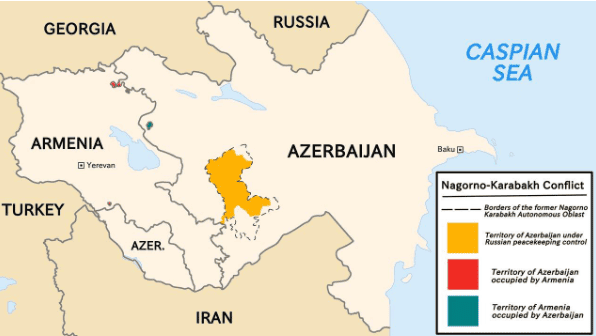By David Davidian
While the collective West appears to be run by diplomatically and strategically challenged leaders, there are some states in the world which should not emulate such nonsense. Two of these states include Armenia and Azerbaijan.

The former has put itself under existential threat. Since coming to power in 2018, Armenian Prime Minister Pashinyan has changed Defense and National Security Ministers five times each, forcing incessant policy discontinuities that preceded and continued through Armenia’s loss in the 2020 Second Karabakh War.
While one could list all the foolishness that has transpired in Armenia since the disintegration of the Soviet Union, the most egregious is its lack of national direction. Worse, we witness a government-fronted partnership in the interests of oligarchs and the law of the jungle for the rest. This condition is more rampant in Azerbaijan, with its petrodollars filling the coffers of Azerbaijan’s ruling dynasty and a vast network of associates.

Since Azerbaijan was given the proverbial green light in the fall of 2020 to invade the self-proclaimed Armenian Republic of Nagorno-Karabakh, it has gone from engaging in a maximalist negotiation position to a post-war occupation of over 40 sq. km of internationally recognized Armenian territory. Azerbaijani President Aliyev’s most outrageous claim is that most of Armenia, if not all, is Azerbaijani. If peace is ever to be achieved between Armenia and Azerbaijan, Azerbaijan must consider diplomacy, other than the caviar variety.
Armenia appears unable to differentiate between transactional children’s games and skilled diplomacy. The latter is nearly nonexistent, as evidenced by the lack of any Armenian diplomat publishing thought-provoking ideas. Armenia’s announcement that it could ratify the International Criminal Court’s Rome Statute and be bound to arrest Russian President Putin if he visits Armenia since the ICC has issued an arrest warrant for Putin. Due to the lack of transparency in Armenia’s government, its people must conclude why such a diplomatic position was even considered. If pushed, Armenia’s government could admit that the ICC is a political institution. Yet, it never bothered to engage in due diligence to investigate if the charges against Putin have any basis. Instead, it preferred to shoot itself in the foot and make an enemy out of Putin. Let’s point out a few realities.
1 – “The International Criminal Court can only intervene where a State is unable or unwilling to genuinely carry out the investigation and prosecute the perpetrators.” The ICC has no army or police force. Thus, if a state wishes to adopt the Rome Statute, the ICC cannot protect a state against any third-party repercussions if the state actively enacts tenets of the ICC. It is naive of Armenia to think anything different.
2 – If Russian President Putin is arrested, that state will have effectively committed an act of war against Russia.
3 – There is no guarantee that the ICC will support any Armenian case against Azerbaijan.
4 – Finally, the ICC charges against Putin have been seriously challenged and appear baseless.
Suppose Armenia claims it will adopt the Rome Statute and threatens to arrest Putin. In that case, Russia could act in kind and as a minimum:
– Shut down much of Armenia’s infrastructure, including its nuclear power reactor, supplying about half of Armenia’s electrical power.
– Shut off gas supplies to Armenia, leaving Armenia virtually with no gas.
– Forbid any transfer of remittances from Russia to Armenia.
– Expel all temporary Armenian workers from Russia.
– Pull any cash it may have in Armenian banks and end all economic activity with Armenia.
– Unilaterally withdraw its peacekeeping forces currently stationed between Armenians of Nagorno-Karabakh and an Azerbaijani military aiming to eliminate them.
Such actions would be just the tip of the iceberg, as Russia could cause an overnight regime change or pull out all of its troops and military equipment from Armenia, leaving Armenia at the mercy of its two hostile neighbors, Azerbaijan and Turkey, each claiming all of Armenia as their own.
Within weeks of Armenia’s threat against Putin, vagarious Armenia announced that it would not arrest Putin. However, Russia retaliated by banning the import of dairy products from Armenia. This lack of direction and foresight represents the aforementioned transactional, kindergarten games.
Suppose Armenia’s government and diplomacy are engaged in a nuanced game, playing off both sides of the emerging multipolar world, that many of us – barking dogs – cannot understand. Given this, why would Armenia’s Parliament Speaker, Alen Simonyan, engage in ‘nuanced diplomacy’ by spitting in the face of a local Armenian who saw him on the street and called him a traitor just a few days ago? The pastime of Armenia’s controlled opposition is calling Armenian government officials, such as their Prime Minister Nikol Pashinyan, traitors.
Armenian diplomacy is as puerile, unsophisticated and naïve as is Azerbaijan a dynastic militaristic dictatorship.
Yerevan, Armenia
Author: David Davidian (Lecturer at the American University of Armenia. He has spent over a decade in technical intelligence analysis at major high technology firms. He resides in Yerevan, Armenia). A collection of his work can be seen at shadowdiplomat.com
(The views expressed in this article belong only to the author and do not necessarily reflect the views of World Geostrategic Insights).







